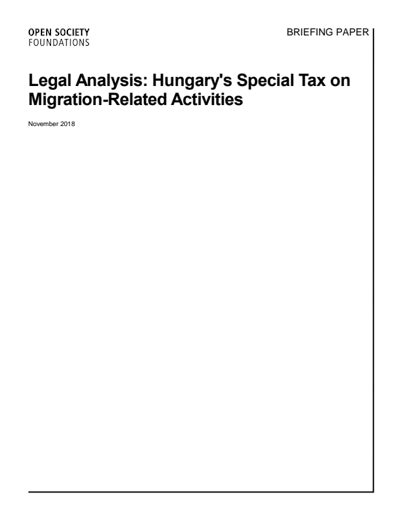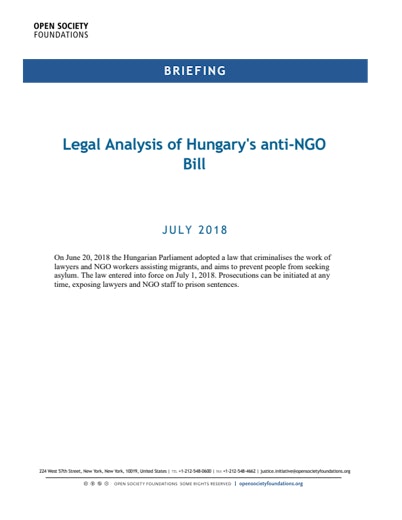Open Society Institute–Budapest v. Hungary
Protecting democracy, freedom of expression, and freedom of association in Hungary
In July and August 2018, two pieces of legislation entered into force in Hungary which were ostensibly targeted at groups or individuals who are judged to be promoting “illegal immigration.” The first measure criminalizes “organizing activities” that support asylum and residence permit applications. The second imposes a 25 percent tax on donations or funding to any group that “promotes migration.”
Hungarian officials have characterized the measures as elements of a campaign against George Soros, the chair and founder of the Open Society Foundations, and against the human rights and other civil society groups that Open Society has worked with in Hungary.
The two provisions are part of a sustained assault on democratic institutions and the rule of law in Hungary that has included a publicly-funded campaign vilifying Soros. In May 2018, the Open Society Foundations announced plans to move their international hub office out of the Hungarian capital, Budapest, citing the threat to its operations posed by the two laws.
Open Society Institute–Budapest, part of the Open Society Foundations network, is challenging the two laws before the European Court of Human Rights, primarily on grounds of violations of the rights to freedom of expression, association, and assembly.
The legal provisions are so broadly drafted that they will have a far-reaching and chilling effect on the work of civil society, far beyond the field of migration.
The application also argues that in addition to the direct impact of the measures on Open Society and its partners in Hungary, the actions of the Hungarian government create a dangerous precedent for rights across Europe.
Facts
Since taking office in 2010, the current Hungarian government has taken numerous measures to limit the independence of Hungarian courts, media, higher education, and civil society.
In response, the European Union and other institutions have repeatedly expressed concern, including through a series of European Parliament resolutions. On September 12, 2018, the European Parliament voted to initiate proceedings against Hungary under Article 7 of the European Union’s treaty, for violating its fundamental values.
In 2017, as part of its attacks against democratic institutions and independent voices, the Hungarian government escalated a concerted campaign to vilify George Soros, the Open Society Foundations, and associated Hungarian civil society organizations. Thousands of anti-Soros billboards were prominently displayed in Budapest and other major cities.
Ahead of national elections held on April 8, 2018, the government indicated that if it was returned to power, as expected, it would introduce a package of “Stop Soros” legislation to target civil society.
On May 15, the Open Society Foundations announced plans to move their international hub offices and staff out of Budapest, citing the threat posed by the proposed legislation to its operations.
The Hungarian parliament, dominated by government MPs, subsequently passed two pieces of legislation:
- Act VI of 2018 introduced Section 353A to the Hungarian Criminal Code, which criminalizes “organizing activities” that support asylum and residence permit applications.
- Act XLI of 2018 imposed a 25 percent tax on donations on funding to any group that “promotes migration.”
Open Society Justice Initiative Involvement
The Open Society Institute–Budapest, part of the Open Society Foundations is represented before the European Court by lawyers from the Open Society Justice Initiative, their in-house legal arm.
Arguments
The application to the European Court of Human Rights argues that the new criminal provision (Section 353A of the Criminal Code) and the new tax provision (Section 253 of Act XLI of 2018) violate Open Society Foundations’ rights to freedom of expression (Article 10), freedom of association, and freedom of assembly (Article 11).
It also argues violations to Article 1 of Protocol n. 1 to the European Convention and Articles 13 and 18 of the European Convention.
Section 353/A and Section 253 were enacted predominantly for purposes other than those prescribed in the Convention. In reality, these laws are predominantly aimed at silencing civil society and barring almost all forms of migration.
These aims are evident from the provisions’ legislative intent, their overbreadth, their lack of foreseeability, the legal and political context in Hungary, including the official campaign against Soros and Open Society Foundations, and the official nomenclatures of Act VI and Section 253 of Act XLI (“Stop Soros Package” and “Soros Tax,” respectively).
Section 353/A interferes with Open Society Institute–Budapest’s right to freedom of expression by criminalizing, preparing, or distributing informational materials, building or operating networks, funding, and other unenumerated activities, including advocacy, in support of asylum or residence applications.
Section 253 interferes with Open Society Institute–Budapest’s right by imposing a tax on its funding of expressive activities to promote migration and subjecting all of the Applicant’s operations to a 25 percent tax. The laws pursue illegitimate aims (see analysis of Article 18 above), are not prescribed by law, and are not necessary in a democratic society, violating Open Society Institute–Budapest’s right to freedom of expression.
Sections 353/A and 253 are not prescribed by law, as they lack foreseeability and certainty. Section 353/A criminalizes an open-ended list of “organizing activities” and Section 253 imposes a 25 percent tax upon all funding for any organization that “carries out activities to promote migration” as well as “any program, action, or activity that is directly or indirectly aimed at promoting immigration.”
Open Society Institute–Budapest’s role, alongside its grantees, as a public watchdog, calls for “the most careful scrutiny” by the court when assessing measures taken by the government to restrict freedom of expression. The most careful scrutiny is also applicable to prior restraints, such as Section 353/A(5)’s criminalization of the preparation of informational materials.
These legal provisions are also not necessary in a democratic society, on account of:
Section 353/A and Section 253 interfere with Open Society Institute–Budapest’s right to freedom of association with respect to building and operating networks (including by holding meetings), receiving funding, and providing funding for migrants’ rights. The laws also interfere with Open Society Institute–Budapest’s right to freedom of assembly with respect to holding meetings on migrants’ and refugees’ rights with Hungarian organizations.
The legal provisions violate Open Society Institute–Budapest’s rights under Article 11, as they pursue predominantly illegitimate aims (see analysis under Article 18 above). Moreover, they are not prescribed by law, as they are not formulated with sufficient precision to enable the persons concerned to foresee, to a degree that is reasonable in the circumstances, the consequences which a given action may entail.
In addition, the provisions are not necessary in a democratic society, because of the nature and severity of sanctions they impose and their overbreadth (see Article 10 analysis).
No effective remedy exists in Hungary to provide redress for Open Society Institute–Budapest’s claims. The Constitutional Court is the only court in Hungary that can review facial challenges to legislation. However, Open Society Institute–Budapest is barred from raising its claims against the tax law before that court. Moreover, there are no effective domestic remedies for obtaining damages for unconstitutional laws.
Making it a crime to provide financial means to any “organizing activity” related to migration and imposing a 25 percent tax on funding for “immigration supporting activities” and organizations interferes with Open Society Institute–Budapest’s right to dispose of its property. These interferences are not prescribed by law, and are not in the general interest of the community (see Article 18 analysis). In addition, the laws’ overbreadth renders them disproportionate (see Article 10 analysis).
Open Society Foundations (Open Society Institute–Budapest) file a second application before the European Court of Human Rights.
Open Society Foundations (Open Society Institute–Budapest) file an application before the European Court of Human Rights.
Act XLI of 2018 enters into force, imposing a 25 percent tax on all activities and organizations which promote migration.
Act VI of 2018 enters into force, introducing Section 353A to the Hungarian Criminal Code.
Related Cases
Related Work
Legal Analysis: Hungary’s Special Tax on Migration-Related Activities
A summary legal analysis of Hungary’s law imposing a special tax on migration-related activities and financing.

Legal Analysis of Hungary’s Anti-NGO Bill
This briefing paper analyzes legislation passed by the Hungarian parliament that criminalizes efforts by civil society groups to offer support to refugees and migrants.

New Legal Opinion Calls on EU to Act on Hungary’s Emergency COVID-19 Laws
The Open Society Justice Initiative and Blackstone Chambers released a legal opinion on Hungary’s Authorization Act and associated decrees, calling on the European Union to hold Hungary accountable for violations of EU law.